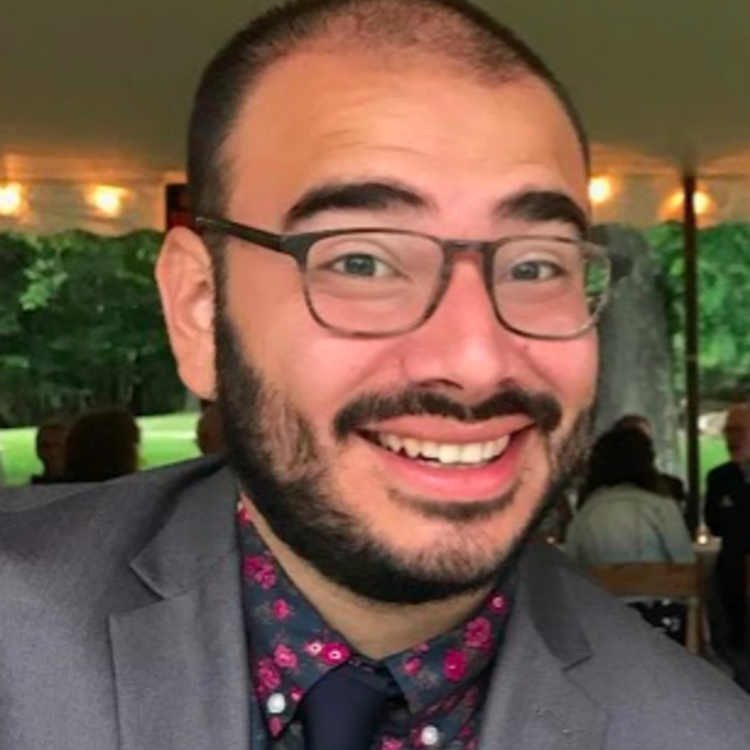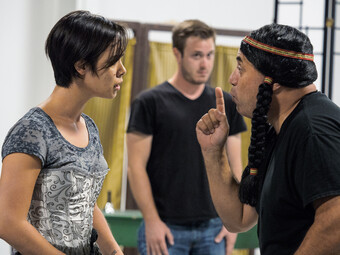On Putting Raisins and Black Olives in Pork Tamales and Living the Latina/o Theatre Commons
Let’s get it out of the way now. Yes, my family puts pitted black olives and raisins in savory pork tamales. To be fair, my entire family doesn’t commit this crime, only my mom’s side of the family. And even of that side, only a small amount of them actually go through the hassle of making tamales. My mom’s family emigrated from Mexico to Southern California in the 1860s to work on a large ranch near Piru. A lot of cultural assimilation can happen in four generations, for example: unorthodox tamales, turkey albondigas, and a son who says things like “Sorry I didn’t shave—I must look like a total Mexican.”
Take the aforementioned son and put him in a room of people gathering to celebrate Latina/o accomplishment and community in the American theatre, and he’s a little confused. Let me be transparent: I was extremely confused. I felt like a total fraud sitting in that room with incredible people who have lived their lives as artists and activists; I felt so distanced from so much of the conversation. I felt like a black olive in the most delicious and traditional tamale.
How did this happen? My paternal grandparents don’t speak English. My father worked in the fields during his youth. I have an aunt named Maria de Jesus. But I speak more Yiddish than Spanish and occasionally need reminding that “the Mexicans” weren’t just the people being targeted for political gain, they included the adorable and loving Antonia Becerra, making menudo Sunday mornings and jumping the language barrier to say, “I love you, Mijo.”
Luckily for me, while feeling like an olive, I found myself in a room with an established force in the American theatre, and perhaps the foundation of the charming Latino stereotype—José Luis Valenzuela. At a meeting of the Latina/o Theatre Commons steering committee in 2013, I went to him with my insecurities of not deserving to be in the room. His warm and generous response taught me the value of this community-specific commons. I was not alone. JLV pushed back against my preconceived notions of what a Latino was, and explained the natural assimilation that comes with multiple generations being born in what was once a new culture. Typing this out as some grand realization is beyond embarrassing—anyone from any culture could have told me the exact same information, but for some reason that was the first time it clicked. (Another shout out is owed to the godmother of this situation, Karen Zacarías; when we were working together at Arena Stage, she always embraced me as her fellow frijole, despite my obvious inadequacies.)
So I’m not alone and in fact my situation is pretty typical—that’s great! Moments of unintentional tokenism as a Latino American theatre professional become a little less awkward because I no longer feel the need to confess that I’m a fraud.
Beneath our various shades of brown and beyond our checked 'Hispanic' identity boxes is a values proposition that bonds us together. We are dedicated to our collective success.
In accepting my Latino-ness as valid, I’ve begun to see how insufficient a one-word label is to describe any race or ethnicity. Sure, I’m proud of my Mexican lineage, but is it really supposed to earn me some kind of credibility with all Latina/o communities? “Hey! We check similar boxes on surveys and individual information forms because of labels we didn’t really choose and I don’t fully understand! We’re basically family.” It’s a level of culture shock that goes beyond what you would expect moving to New England. It’s a self-inflicted intimidation that can have a huge impact on work to build organic and genuine relationships with people from all communities.
When I start to convince myself that it’s only a matter of time until I am cast out for my behavioral “whiteness,” I think about the Latina/o Theatre Commons. I think about the family I saw created over three days in 2013 and the family I watched grow from far away at November 2014’s Encuentro. Beneath our various shades of brown and beyond our checked “Hispanic” identity boxes is a values proposition that bonds us together. We are dedicated to our collective success. This movement can be tracked in a series of acts of generosity between life-long collaborators and total strangers. As the expansiveness of Latina/o culture reveals itself to me through every day interactions in the theatre and in the world, I try to stay grounded in those principles. Of course there isn’t a guaranteed bond between Latina/os and me. But there is an opportunity to find common ground through engaged listening and a desire to meet people where they are and discover ways to collaborate. In our specific communities (cultural or otherwise) we can gain experience using these tools that we then can aspire to bring to every collaborative encounter. It seems obvious, but sometimes it can be difficult to put into practice.
It seems that the future is all about blurring boxes. As we barrel towards the inevitability of a multiracial majority, we must learn to expect that the hard lines we place around community and culture have huge variance when examined on an individual level. So maybe I put black olives in my pork tamales and maybe you wrap your tamales in banana leaves—let’s celebrate our differences and throw them in the face of what it means to be Latina/o.









Comments
The article is just the start of the conversation—we want to know what you think about this subject, too! HowlRound is a space for knowledge-sharing, and we welcome spirited, thoughtful, and on-topic dialogue. Find our full comments policy here
Love you, mijo!